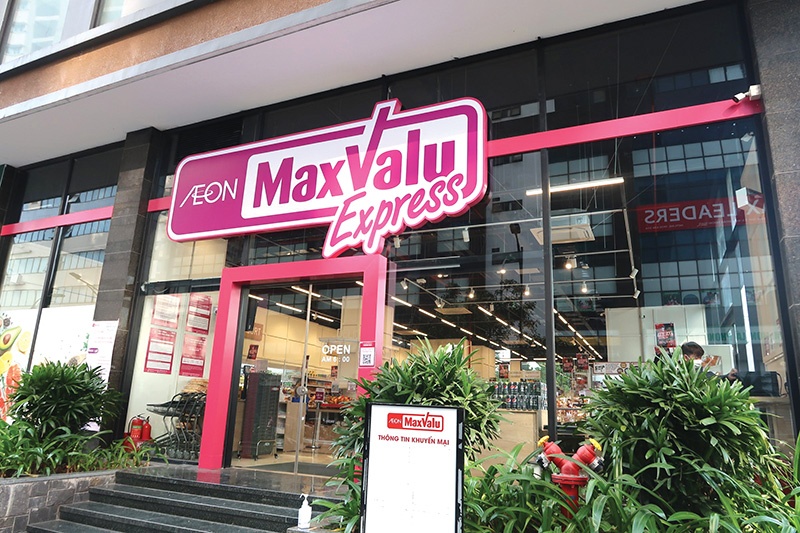Japanese mainstays diversify investments
 |
| AEON Vietnam wants to reach 30 stores in the country by the end of the decade |
Muira Shota, CFO at Uniqlo Vietnam, said, “On February 25, we announced that we will open a new store in a major shopping centre in Ho Chi Minh City in the spring-summer season of this year, as well as plan to continue our active business activities in the future.”
To maximise the potential of the Vietnamese market, according to Shota, it would be essential in Vietnam to have both production and sales functions while optimising the supply chain.
“We recognise that textiles are an important industry for the country. If our business expands, the production volume of our factories will also increase, and production and sales will be integrated to contribute to society,” Shota added.
Uniqlo established its company in Vietnam in 2018, and opened its first store in Ho Chi Minh City in 2019. In March 2020, Uniqlo opened its second business in Hanoi’s Dong Da district. The fashion chain boasts 10 stores in the country and an e-commerce presence.
Entering Vietnam in 2009, so far AEON Vietnam has six stores and general merchandise stores, 25 supermarkets, 41 specialised outlets, one e-commerce channel and one distribution centre.
Furusawa Yasuyuki, general director of AEON Vietnam, said the country would have a much higher growth rate than Japan.
“There are many Japanese businesses willing to invest in Vietnam. The country has high population growth and economic development potential. The living standards of Vietnamese will also gradually be improved. Thus, industries for services, equipment, and consumer goods will also have much more potential for development in the future,” Yasuyuki said.
AEON Group is planning to expand its system to reach more than 30 stores by 2030, aiming to further research and development to enrich the quality of life for local consumers. The conglomerate also wants to promote domestic products for export to Japan and other countries and is currently cooperating with local authorities and manufacturers for mutual development.
Meanwhile, real estate developers from Japan are expanding their portfolios into Vietnam. Among them are Mitsubishi, Nomura Real Estate, Takashimaya, and many more.
Hirai Shinji, chief representative of the Japan External Trade Organisation (JETRO) in Ho Chi Minh City, said that in the past few years, the investment fields of Japanese enterprises in Vietnam have become more diversified. “In the past, most were mainly export processing companies, but now, capital flows to domestic consumption such as retail and real estate increased besides other areas. The main focus is shifting from manufacturing to non-manufacturing,” Shinji said.
Besides this, although input costs and labour costs in Vietnam have been increasing in recent years, they are still low compared to Japan. The workforce is also assessed as dynamic and highly productive.
“With those outstanding advantages, many Japanese companies operating in industries with large labour costs such as IT and retail are expected to expand their investment in Vietnam,” Shinji added.
A survey by JETRO last December last year with more than 700 Japanese companies in Vietnam showed that around 55.3 per cent of Japanese businesses look to expand their operations in the next one to two years, up 8.5 percentage points against the previous year, ranking first in ASEAN.
Shinji analysed that the proportion of profitable Japanese enterprises in the country last year was 54.3 per cent, up 4.7 percentage points compared to 2020. Meanwhile, 56.2 per cent of surveyed businesses answered “improved” when being asked about their business profit prospects in 2022 compared to 2021. Nearly 70 per cent of Japanese businesses stated that Vietnam has market capabilities and development potential.
What the stars mean:
★ Poor ★ ★ Promising ★★★ Good ★★★★ Very good ★★★★★ Exceptional
Related Contents
Latest News
More News
- SK Innovation-led consortium wins $2.3 billion LNG project in Nghe An (February 25, 2026 | 07:56)
- THACO opens $70 million manufacturing complex in Danang (February 25, 2026 | 07:54)
- Phu Quoc International Airport expansion approved to meet rising demand (February 24, 2026 | 10:00)
- Bac Giang International Logistics Centre faces land clearance barrier (February 24, 2026 | 08:00)
- Bright prospects abound in European investment (February 19, 2026 | 20:27)
- Internal strengths attest to commitment to progress (February 19, 2026 | 20:13)
- Vietnam, New Zealand seek level-up in ties (February 19, 2026 | 18:06)
- Untapped potential in relations with Indonesia (February 19, 2026 | 17:56)
- German strengths match Vietnamese aspirations (February 19, 2026 | 17:40)
- Kim Long Motor and AOJ Suzhou enter strategic partnership (February 16, 2026 | 13:27)

 Tag:
Tag:




















 Mobile Version
Mobile Version